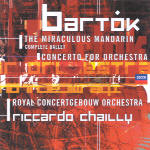Riccardo Chailly and the Royal Concertgebouw turn in two very memorable Bartók performances, with more than enough personality to justify a collector’s interest. The Concerto for Orchestra opens with the most atmospheric introduction since Kubelik’s Boston recording: listen to the dark, liquid sound of the trumpets against quietly moving strings. This is the real deal. The remainder of the movement follows standard tempos until Chailly adds a jolt of energy in the coda that places the overall interpretation well above the level of the ordinary. The second movement, predictably, showcases the stupendous Concertgebouw winds, but Chailly’s swift tempo again raises the voltage level and introduces an exciting element of risk to the proceedings.
The third movement Elegy reveals conductor and orchestra paying particular attention to the tremolo string textures that accompany the initial wind arabesques, and the effect is certainly riveting, as is the plangent wind recitative after the first big climax. A perfectly-scaled fourth movement, it’s nasty “interruption” excellently judged, leads to a slightly disappointing finale. The carefully precise string articulation and welcome attention to dynamics can’t conceal the lack of sheer adrenaline, although as in the first movement Chailly pulls out all the stops in the coda. Just a touch more juice in the opening pages and this performance easily would have become a prime recommendation. As it stands, it falls just a hair short.
No such reservations apply to the complete Miraculous Mandarin. This version easily matches the best of the competition. Highlights include a stunningly seductive principal clarinet solo, a thrillingly fast (but clean and precise) “chase” fugato, with the awkwardly written percussion parts deftly touched in, and ideal balances in the closing moments between wordless chorus and orchestra. Here, Chailly once again demonstrates his keen ear for atmosphere, keeping the voices well integrated with the instrumental textures for a truly terrifying, haunted effect. My only criticism concerns the fact that the skirling winds cover the pentatonic trombone theme at the Mandarin’s first entrance. This ought to sound more clearly, particularly as the same music’s reappearance at the climax of the chase offers an important structural signpost to the listener. It’s a minor point though, and certainly not one that should discourage purchase of what is in all other respects a hugely impressive performance, like the Concerto richly and truthfully recorded. [2/4/2002]
































